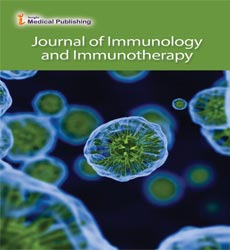Influence of Endocrine System on Human Immune Homeostasis
Ethan Fisher*
Editorial office, Journal of Immunology and Immunotherapy, United Kingdom
- *Corresponding Author:
- Ethan Fisher Editorial office, Journal of Immunology and Immunotherapy, United Kingdom E-mail: jmso@emedicinejournals.org
Received Date: April 05, 2021; Accepted Date: April 08, 2021; Published Date: April 16, 2021
Citation: Fisher E (2021) Influence of Endocrine System on Human Immune Homeostasis. J Immuno Immunother. Vol.5 No.2:08.
Editorial Note
The immune system must be closely regulated to avoid potentially harmful over-response to infections, and it must also be actively maintained in a responsive condition when there is no immediate threat. These regulation and maintenance activities are critical for maintaining immunological homeostasis and are governed by a network of cellular and molecular connections. The effects of thyroid and pituitary hormones, thyrotrophin and thyroxin, on immunological homeostasis in humans are highlighted herein. This study demonstrates that these hormones have homeostatic effects on T and B cells, raising the potential that the endocrine system might be controlled to influence the immunological response.
The immune system is a very dynamic system. To respond appropriately to a pathogenic challenge, it must be able to rapidly proliferate and differentiate particular populations of cells, which must subsequently shrink back to normal numbers after the challenge has passed. Not only are these growing cells required in enormous numbers, but they are also highly cytotoxic, equipped with a slew of effector chemicals to combat intra- and extracellular dangers. In general, this coordinated reaction is extremely successful and well-balanced. In the absence of risk, the immune system enters a steady state in which the effectors and their precursors are maintained in sufficient numbers to create the appropriate response rapidly when needed. This 'homeostatic' condition is carefully controlled by processes that are currently being discovered.
Many mechanisms maintain immune homeostasis at both the systemic and tissue-specific levels. It has long been recognized that these complex and interconnected systems need coordination between cellular and molecular aspects of both the immune system and the neuroendocrine system. Cytokines, glucocorticoids, prostaglandins, and the microbiota all play critical roles in immune homeostasis regulation. Many immunologists are aware with the involvement of cytokines like IL-7 and IL-15 in maintaining an adequate number of T cells. Glucocorticoids, among other things, play an important role in the resolution of inflammation caused by both myeloid and T cells. Similarly, prostaglandins have complicated context-dependent effects on the immune response and can help to restore homeostasis following an inflammatory response.
Networks of hormones generated by the thyroid and pituitary glands, such as thyroxin (T4) and thyrotrophin (aka Thyroid- Stimulating Hormone (TSH)), are also crucial for homeostasis. Thyroid hormones exert their effects after entering cells via interactions with thyroid hormone receptors, transcription factors that can favorably or negatively control the expression of a wide range of genes.
While many of the processes by which thyroid hormones affect immune cells have been studied in isolation and in the context of hyper- or hypothyroidism, determining their overall impact on immune physiology in people has proven difficult. We highlight a research that used data from the Human Functional Genomics Project to better understand the role of FT4 and TSH in immunological homeostasis at the population level. The researchers wanted to know how these connections may impact susceptibility to infections, autoimmune diseases, and cancer. Data from 489 healthy people in the 500FG cohort were used in preliminary studies. The 300BCG cohort was used to validate these. The researchers investigated correlations between T4 and TSH and immunological markers in the cohort after discovering the predicted greater T4 levels in men compared to females and a connection between rising ages and decreasing T4 levels. There were little links found between these hormones and circulating cytokines, monocyte and lymphocyte-derived cytokines generated in culture, or circulating monocyte, neutrophil, and monocyte populations. However, significant positive associations were found between TSH and the amount of circulating T cells in both groups.
Furthermore, T4 concentrations linked favorably with the number of numerous circulating B-cell populations. Associations with single nucleotide polymorphisms were explored in the 500FG cohort to better understand how circulating TSH and T4 concentrations may be regulated in the population. Four intriguing SNPs were found to be related (p<1e-6), with two of them mapping to variations in genes known to be associated with thyroid-associated hormone networks. Finally, pathway analysis indicated rather substantial correlations between genetic loci influencing T4 concentrations and immune-related pathways.
This work offers the potential that the endocrine system might be modified to increase the efficiency of immunotherapy or vaccination, or possibly to alleviate lymphocyte deficiencies in the elderly, by discovering the effects of thyroid hormones on lymphocyte homeostasis in healthy individuals.
Open Access Journals
- Aquaculture & Veterinary Science
- Chemistry & Chemical Sciences
- Clinical Sciences
- Engineering
- General Science
- Genetics & Molecular Biology
- Health Care & Nursing
- Immunology & Microbiology
- Materials Science
- Mathematics & Physics
- Medical Sciences
- Neurology & Psychiatry
- Oncology & Cancer Science
- Pharmaceutical Sciences
